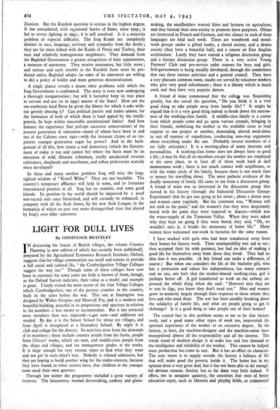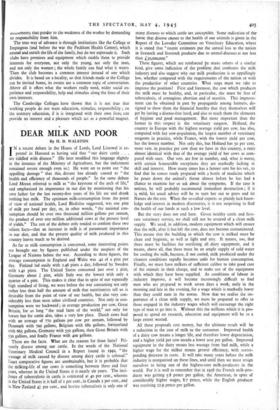LIGHT FOR DULL LIVES
By CONSTANCE REAVELEY
IN discussing the future of British villages, the volume Country Planning (a new edition of which has recently been published); prepared by the Agricultural Economics Research Institute, Oxford, suggests that for village communities too small- and remote to provide a full social and cultural life, " the Cambridgeshire Village Colleges suggest the way out." Though some of these colleges have now been in existence for some years too little is known of them, though, as the Oxford Survey indicates, their value as a model and example is great. I lately visited the most recent of the four Village Colleges which Cambridgeshire, one of the poorest counties in the country, built in the years before the war. This one at Impington was designed by Walter Gropius and Maxwell Fry, and is a modern and beautiful building, peaceful in its proportions and spacious in relation to the numbers ;t was meant to accommodate. But it has attracted more members than was expected—I,400 now—and additions are needed. By day it is. the Senior School for about ten villages, and from April is recognised as a Secondary School. By night it is club and college for the district. Its activities arise from the demands
of its members ; these include country people from the farms, people from Chivers' works, which are near, and middle-class people from the shops and villages, and the management grades at the works. It is large enough for very various types to find what they want and not get in each other's way. Nobody is refused admission, but they are hoping to build another wing for the under-sixteens, because they have found, as other centres have, that children in the younger teens need their own quarters.
Through last winter the programme included a great variety of interests. The housewives wanted dressmaking, cookery and gloat- making, the smallholders wanted films and lectures on agriculture, and they formed their own society to promote these purposes. Others are interested in French and Gerinan, and two classes in each of these languages are held each week. There are woodwork and metal- work groups under a gifted leader, a choral society, and a -drama society (they have a beautiful hall), and a course on East Anglian architecture. Lately they have started a religious discussion, group and a literary discussion group. There is a very active Young Farmers' Club and pre-service cadet courses for boys and girls. Self-government is being steadily developed, through the cominittees that run these various activities and a general council. They have a very pleasant common room, snarks are served by volunteer workers who give very good refreshment ; there is a library which is much used, and they have very popular dances.
A friend of mine commented that the coney was flourishing greatly, but she raised the question, " Do you think it is a very good thing to take people away from family life?" It might be argued that it is a very good thing indeed to break down the narrow- ness of the working-class family. A middle-class family is a centre from which people come and go upon various errands, bringing in their friends,• mobilising the mother or the available sister to lend support to one project or another, demanding altered meal-times to suit all manner of expeditions, conducting non-stop arguments about everything under the sun. (Probably several members of -it are fully articulate.) It is a meeting-place of many interests and personalities. A working-class home does not always have so good a life ; it may be that all its members except the mother are employed at the same place, or at least all of them. work hard at dull monotonous -work ; there is not much contact with neighbours, or with the wider circle of the family, because there is not much time or money for travelling about. The most pathetic evidence of the deadly monotony bf family life came to me from a discussion group. A friend of mine was so interested in the discussion group that started in his factory (through the Industrial Discussion Groups Experiment) that he got one going in his street ; about a dozen men and women came regularly. But his comment was, " Women will not stick to the point," and the women's that they were despetately bored with the point they were required to discuss—which was the water-supply of the Tennessee Valley. When they were asked why they kept on going if they were -bored, they said, " Oh, we wouldn't miss it, it breaks the monotony of home life." Many women have welcomed war-work in factories for the same reason.
I have worked with girls who had been transferred away from • their homes for factory work. Their unadaptability was sad to see ; they accepted their lot with patience, but had no idea of -making a good life for themselves away from those they loved. They had no idea that it was possible. .(A boy friend can make a difference, of course.) But when one considers the life of the bachelor girl, who has a profession and values her independence, has many contacts and no ties, one feels that the mother-bound working-class girl is -perhaps better off. A girl transferred to work on the railway ex- pressed' the whole thing when she said : " However nice they are to you in digs, you know they don't need you." Men and women grow to maturity largely through their response to those whom they love and who need them. The war has been steadily breaking down the solidarity of family life, and whit are people going to get in exchange? Is it a good thing to take people out of their homes?
The central fact in this problem seems to me to be that factory work, and a good many other types of work too, impoverish the spiritual experience of the worker to an excessive degree. In the factory, at least, the machine-designer and the machine-setter have monopolised almost all the responsibility and all the interest. The whole trend of modern design is to make less and less demand on the intelligence and reliability of the worker.' This cannot be helped, mass production has come to stay. But• it has an effect on character. The next move is to supply outside the factory a fullness of life that will make good the poverty inside it. The home has in my opinion done a very great deal, but it has not been able to do enough, felt obvious reasons. Society has.so far done very little indeed. It offers, not in adequate quantity, the amenities that men of better education enjoy, such as libraries and playing fields,_or. commercial amusements that pander to the weakness of the worker by demanding no responsibility from him.
The true way of advance is through institutions like the College at Impington (and before the war the Peckham-Health Centre), which extend and enrich the life of the family, but do not supersede it. Such clubs have premises and equipment which enable them to provide interests for everyone, not only the young, not only the men, and not only the women ; the whole family can find what it wants. Then the 'club becomes a common interest instead of one which divides. It is based on a locality, so that friends made at the College can be invited home, its events are a common topic of conversation. Above all it offers what the workers really need, wider social ex- perience and responsibility, help and stimulus along the lines of their own interests.
The Cambridge Colleges have shown that it is not true that working people do not want education, stimulus, responsibility ; on the contrary education, if it is integrated with their own lives; can provide an interest and a pleasure which act as a powerful magnet.



























 Previous page
Previous page